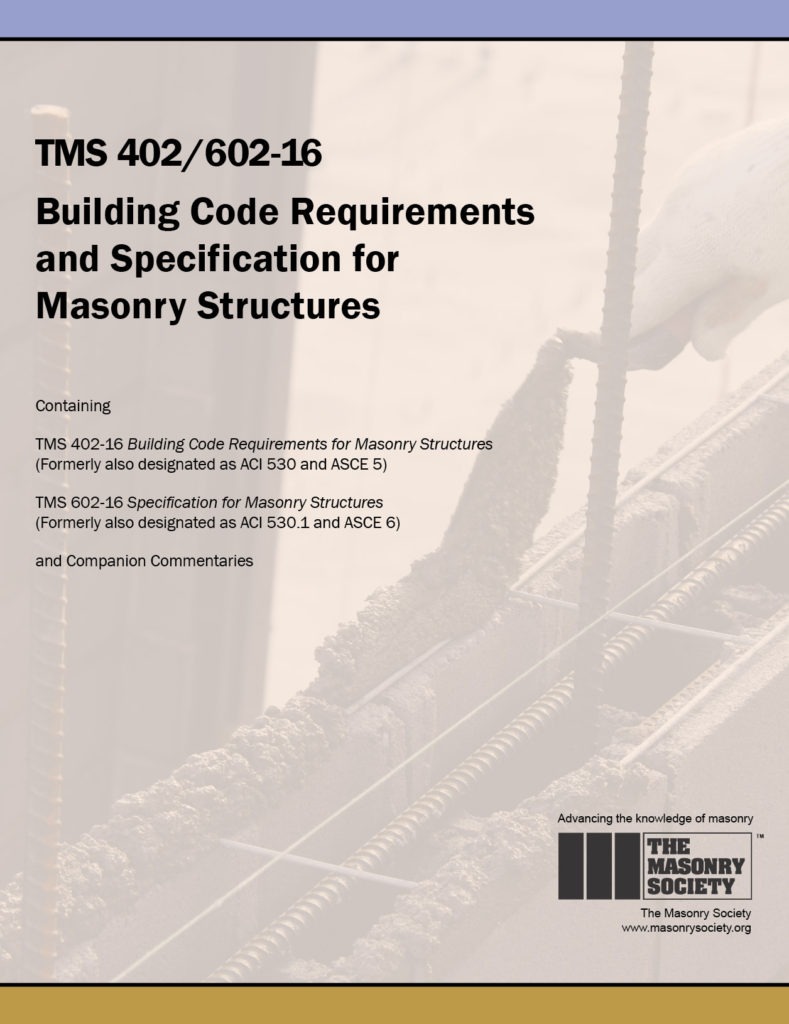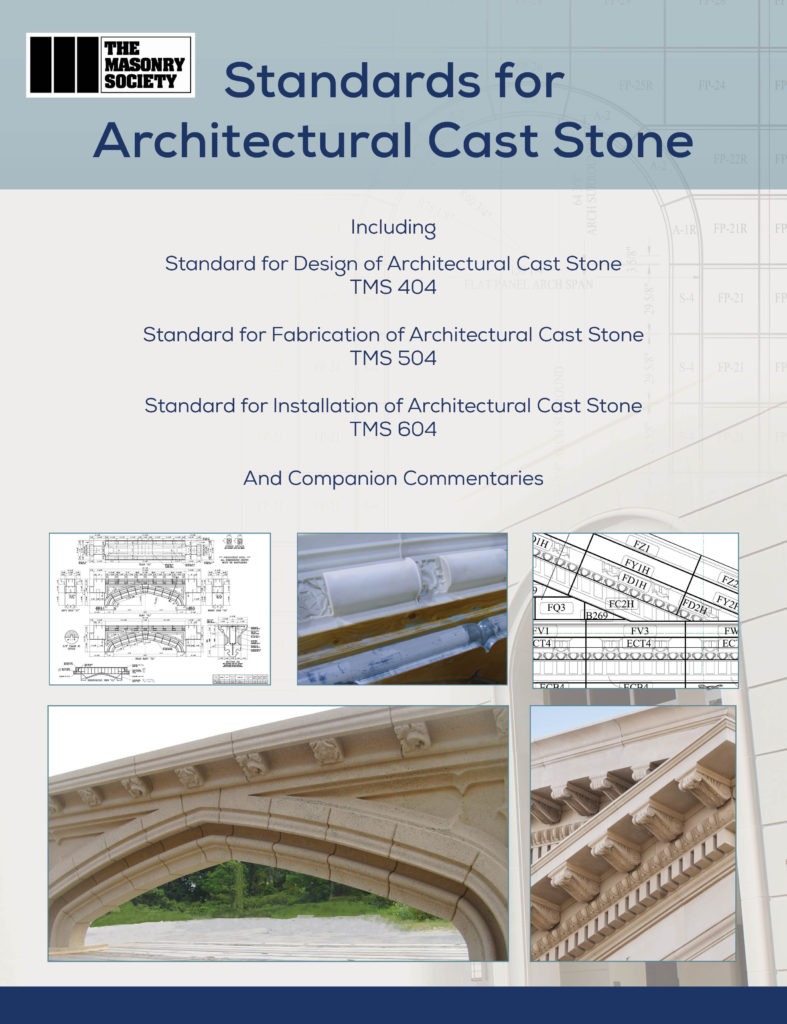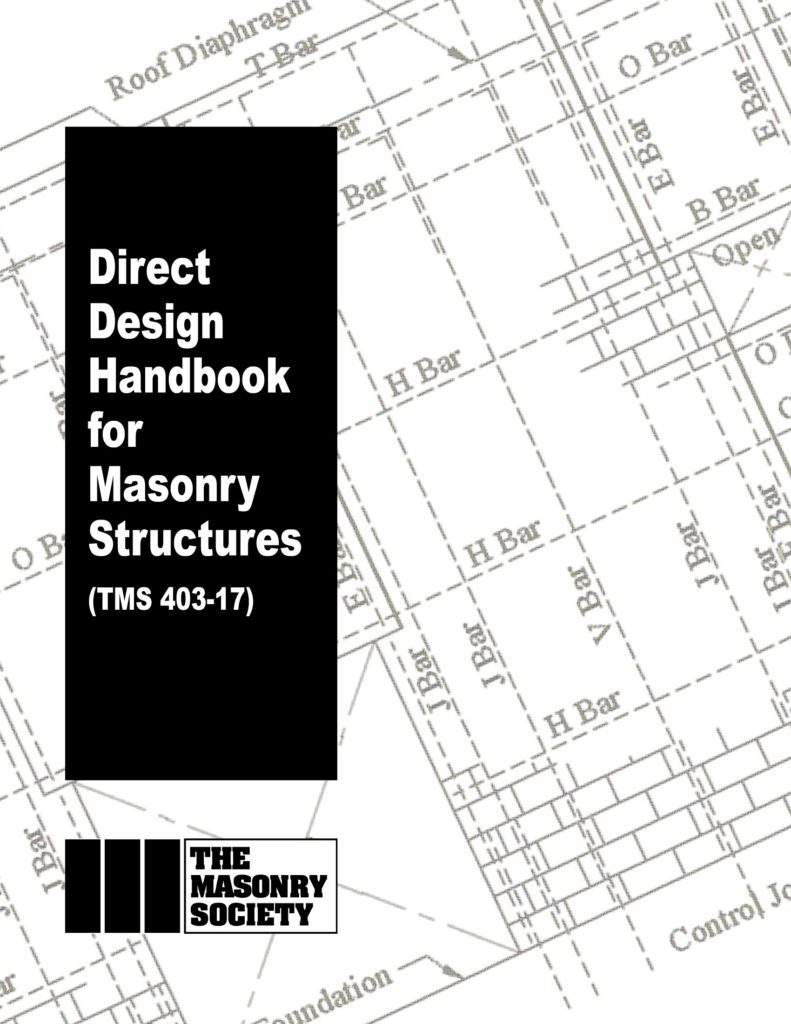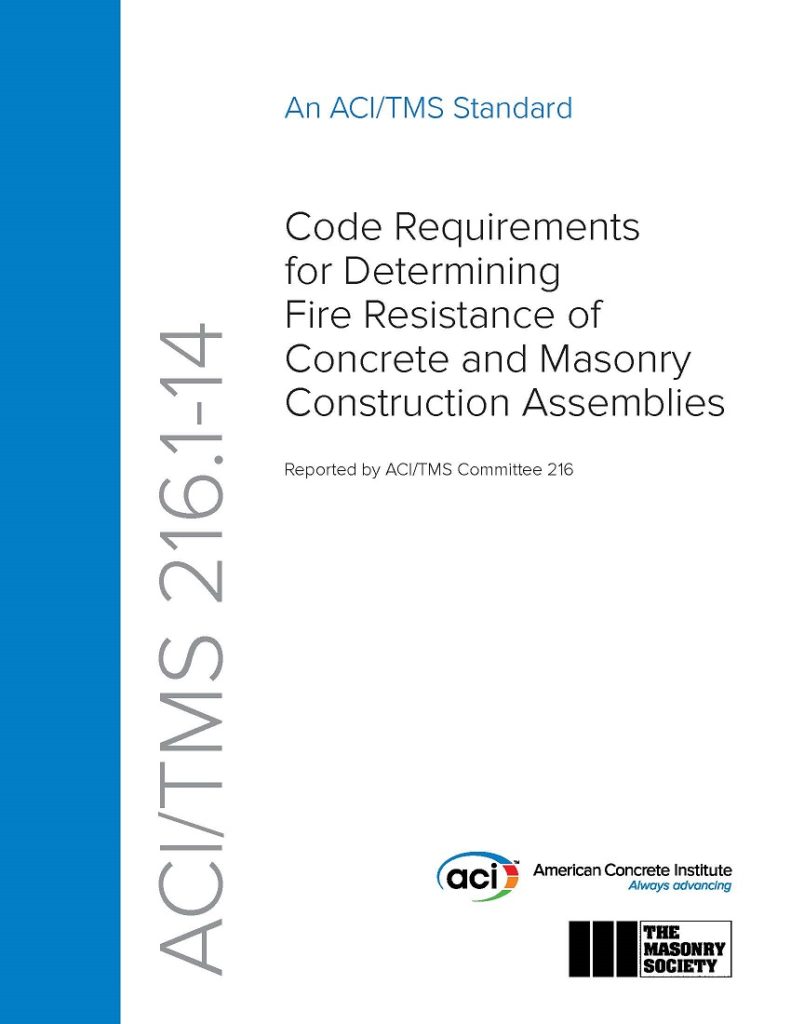The Masonry Society – Advancing Knowledge of Masonry
Words: Phil Samblanet
Photos: TMS
While the good work of MCAA and other masonry associations is evident to all, many may not be as familiar with The Masonry Society (TMS). TMS is a small, but effective professional society dedicated to advancing knowledge of masonry, its development, and its application. And if you work in the masonry industry, you likely have encountered TMS’ flagship standard, TMS 402/602 Building Code Requirements and Specification for Masonry Structures (Figure 1). In recent years, TMS has assisted the industry in developing a number of standards that are in turn referenced by the International Building Code, International Residential Code, and other codes (See Sidebar 1). These standards, and other guides, textbooks, and resources developed by TMS Members and Committees help advance masonry knowledge so that masonry remains the material of choice.
Started in 1977, The Masonry Society is chartered as a not-for-profit professional society that is for education and research; and TMS Members are chiefly designers and members of the masonry industry who come together to share ideas on improving masonry design, construction, evaluation, and repair. However, TMS is an organization for all, and its work in codes and standards, as well as educating designers and students, is critically important to the health and vibrancy of the masonry industry.
Much of TMS’s work is done through its committees, and mason contractors and other construction professionals are encouraged to participate to ensure issues of importance to them are considered. As noted in Sidebar 2, several committees are actively looking for members. Missions, goals, and activities of these Committees are shown on TMS’s website (www.masonrysociety.org) along with applications for committee or Society membership.
Upcoming TMS Events and Deadlines for Comment
TMS conducts business at spring and fall meetings each year, which for 2021 are scheduled on April 19-23rd (likely held virtually) and then in Nashville, Tennessee on October 13-16. Guests, those curious about the workings of the Society, and new members are always welcomed! TMS meetings often include educational sessions, and those wishing to present non-promotional technical presentations in 2021 may submit a title, abstract, and speaker information to TMS by March 30th for consideration.
Those that use TMS 402/602 should also mark their calendars for the TMS 402/602 Public Comment Period, scheduled from June 1 through July 15, 2021. During this time, revisions proposed for the 2022 Edition of TMS 402/602 are available for review, and anyone may offer comments for consideration by the Committee. This public comment period occurs only once during a revision cycle, and it is one of the main ways to have your comments and concerns considered (attending the meetings and participating in discussions is by far more effective).

TMS also began Night School this past fall and will continue with a new course on Strength Design of Masonry during February and March. These courses are fantastic ways to learn from the experts on the topics, while also being able to ask questions, earn PDHs, and delve into topics in more depth than shorter webinars.
Plans for 2021 and Beyond
2021 will be another busy and productive year for The Masonry Society. In addition to the meetings and deadlines noted above, TMS is working on several important projects during the year:
- Masonry Education Hub: Thanks to sponsorship from the National Concrete Masonry Association, Western States Clay Products Association, and the Portland Cement Association, TMS will soon be debuting a Masonry Education Hub with over 2 dozen webinars and courses so that people can learn “on-demand”, while also earning AIA Learning Units (LU’s), Professional Develop Hours (PDH’s) and Continuing Educations Units (CEU’s) that may be required for professional registrations. Topics will address masonry units, mortar, grout, code updates, strength design of masonry, and more. New content will continually be added so check the website often.
- Dry Stack Masonry Guide: The Design Practices Committee is nearing completion on Design and Construction Guidelines for Dry-Stack Concrete Masonry.
- Masonry Testing Night School/Certifications: During the fall of 2021, a new Night School addressing masonry testing of units, mortar, grout, and assemblies are being planned as well as a possible in-person ACI Certification session at the National Concrete Masonry Association in Herndon, Virginia.
- TMS Newsletters and Reports: TMS Sustainability E-News will continue to be produced twice monthly and is offered free to all. In addition, TMS E-Newsletters, E-News Briefs, TMS Responds, and TMS Journal keep members and friends informed of what is happening with TMS; answer common, and not-so-common questions on masonry; and report on masonry research efforts. TMS also hopes to debut “Masonry Tip Sheets” to help designers, contractors, inspectors, and testing technicians.
The Masonry Society is busy! And we are thinking of other ways to support the industry and help designers, educators and students. Over the next few months and years, we’ll be wrestling with a possible online platform to allow access to TMS Standard 402/602 with complete internal referencing and possible “enhanced commentary” with links to papers, examples, technical notes and more. A “Virtual Masonry Professors/Educators Workshop” is being considered to assist those teaching masonry courses. And we hope to post some short videos to address topics such as “What is f’m?” and “What is a Brick Block?”
To find out more about what TMS is doing, and to become involved, please visit us at our website (masonrysociety.org), or contact us at info@masonrysociety.org. We hope you’ll become part of the team!
SIDEBAR 1
Current Standards developed by TMS include:
Building Code Requirements and Specification for Masonry Structures contains two standards and their commentaries: Building Code Requirements for Masonry Structures designated as TMS 402-16 (and formerly designated as TMS 402/ACI 530/ASCE 5) and Specification for Masonry Structures designated as TMS 602-16 (and formerly designated as TMS 602/ACI 530.1/ASCE 6).
The Code covers the design and construction of masonry structures while the Specification is concerned with minimum construction requirements for masonry in structures.
- Code Requirements for Determining Fire Resistance of Concrete and Masonry Construction Assemblies (ACI/TMS 216.1) contains design and analytical procedures for determining the fire resistance of concrete and masonry members and building assemblies.
- Standard Method for Determining the Sound Transmission Ratings for Masonry Assemblies (TMS 302) provides minimum requirements for rating masonry walls for sound transmission class (STC) and outdoor-indoor transmission class (OITC) based on testing calibrated calculation procedures for concrete masonry and clay masonry assemblies.
- Standards for Architectural Cast Stone contains three standards and their commentaries:
- TMS 404: Standard for Design of Architectural Cast Stone
- TMS 504: Standard for Fabrication of Architectural Cast Stone
- TMS 604: Standard Specification for Installation of Architectural Cast Stone

Together these standards cover the design, fabrication, and installation of cast stone systems and elements included in structures or assemblies.
- Direct Design Handbook for Masonry Structures (TMS 403) provides a simplified procedure for the structural design of reinforced concrete masonry and clay masonry structures. The procedure is based on the strength design provisions of TMS 402 Building Code Requirements for Masonry Structures and ASCE 7 Minimum Design Loads for Buildings and Other Structures. The document is applicable to both residential and commercial structures.

Other standards that are being developed or considered include:
- Thermal Properties of Concrete and Masonry for Use in Determining Energy Code Compliance. To be developed jointly with the American Concrete Institute as the lead sponsor under ACI/TMS 122 Committee.
- Methods to Evaluate and Mitigate Thermal Anomalies in Concrete and Masonry Building Envelope Components. To be developed jointly with the American Concrete Institute as the lead sponsor under ACI/TMS 122 Committee.
- Methods of Design of Passive Solar Buildings. To be developed jointly with the American Concrete Institute as the lead sponsor under ACI/TMS 122 Committee.
- Standard for the Design and Construction of Segmental Retaining Walls (TMS xxx) Scope: This standard would cover the minimum requirements for dry-stack modular block segmental retaining wall (SRW) systems.
Sidebar 2
TMS Committees Seeking Contractor and Designer Members
TMS has a number of Committees that do the work of the Society. You may apply for membership on TMS Committees on the Society’s website of www.masonrysociety.org. Several TMS Committees are currently looking for new members including:
Building Information Modeling for Masonry Committee (BIM-M) provides a structure for implementing and maintaining BIM for the masonry industry. The Committee is currently considering a request to host additional information on TMS’s website related to BIM-M.
Building Performance Committee (BPC) addresses high-performance building design with masonry through sustainability, resilience, and energy performance. Its goals include educating designers and others on best practices for masonry, providing guidelines for building performance of masonry, and disseminating relevant information to the masonry industry
Construction Practices Committee (CPC) identifies current construction practices and investigates methods for improving these practices. The CPC’s goals include stimulate the improvement of construction practices, which will enhance the productivity and quality of masonry construction. The Committee has developed a number of helpful Preconstruction Topic Sheets, an Inspection Checklist, and responses to technical inquiries.

Design Practices Committee (DPC) identifies current practices and resources related to the design of masonry; investigates methods of improving those practices and resources; or in their absence, develops new practices and resources. The Committee is responsible for a number of TMS publications and is working on a Dry Stack Masonry Guide.
Existing Masonry Committee (EMC) disseminates knowledge on masonry evaluation, repair, rehabilitation, and restoration through TMS publications and presentations. The EMC developed the Guide for Condition Assessment of Masonry Facades, a document describing a general process approach for evaluation of existing masonry facades, and is working on a Guide for Maintenance of Masonry Facades.